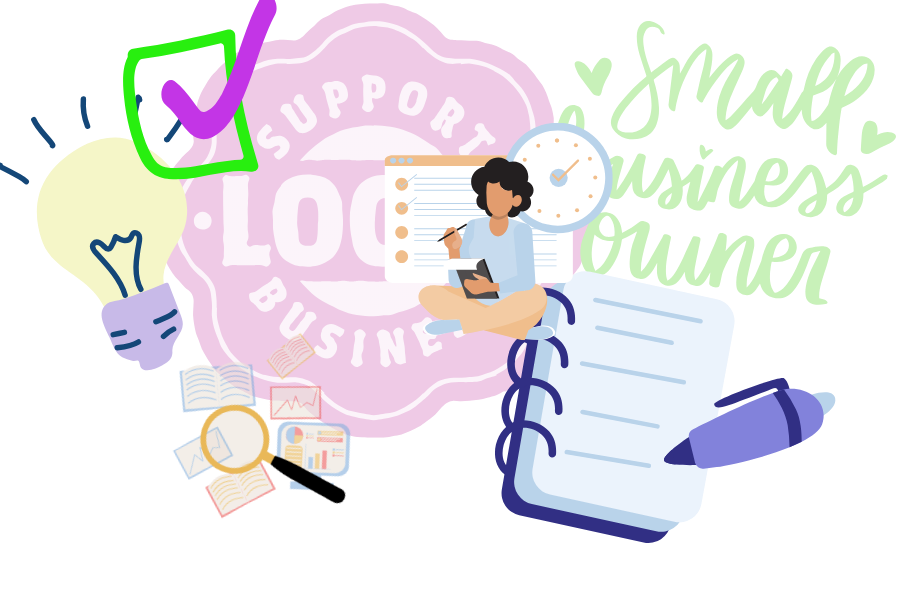
10 things to know when you start your own small business.
Debbie LukasShare
Starting a small business is both easy and difficult.
Most of it depends on your chosen business idea, your local authority rules and where to actually start.
Here I'm going to go through the top 10 things to consider if you are in the UK. Scotland, Ireland and Wales may be different so check it out first.
#1 Choose your product or service
This seems pretty obvious but oftentimes what we'd like to do full time may not be adaptable as a business. Study your interest, what are the options and variations? Is it a physical or digital product or service? When you understand and have clarified a selection then you have a business idea.
_______________________________________________
#2 Choose a business name
This is important next step. Once you have chosen a few options, see if the website domains are available. If they are, pick your favourite and purchase your domain. Even if you don't plan on a website/shop just yet, just lock in your domain for later. You may want a neutral or specific email address too, don't use gmail, yahoo or anything such as that.
#3 Where will you be working from?
If you are working from a small bedroom or the kitchen table, if it's effective for the time being, check out your local council for any rules and regulations. Most authorities are fine with a home business of any form and that passes you over to the business side of things such as:
1. business rates 2. business insurance
#4 Equipment you will need
What items do you have that will get you started? What do you need to purchase to enhance the process? What about postage and packaging items?
Make a list of all the things your business will need to set you up today.
#5 Finances
Are you able to finance your business today? Do you have enough to get you started with a few products? If you are a service/digital based business, can you begin your services? If, for example, you need a better laptop, can you purchase it or can you make do for a while?
What funding would you need if you can't purchase things yourself?
Who does small business funding in your area?
Research funding option online.
Be clear on what you need to pay for, even down to the extra electricity, phone costs, internet etc.
#6 Write a business plan
There are many free business plans free free freebusiness plansonline to either use or use as a model for your own plan. This is where you will project your business needs and growths for the next year, 3 years and 6 years. Take your time on this, be as detailed as you can.
The purpose of a detailed business plan is so if/when you present it to a financier, they will see what you see.
#7 Build up a small product collection or have services written out.
Don't worry about having a million products, just do a few that represent your business and use them to introduce the world to you and your goodness. Use photography to share them in different ways, ie. if you have 10 products, vary how you photo them with props, lighting, singularly, all together. Add shots with you in them holding one/some up. Show them in use. The ideas are endless but the plan is to gather a folder of content to use in different ways on different platforms.
#8 Social Media
It's natural to spread yourself thin across all Social Media. Choose one for the time being, just to get you going. Once you have chosen on, let's say, Instagram, use their filters and searches to find others who are looking for what you do. Perhaps connect with others who do what you do. Find or build a community to share you work and see where that leads you. You may find that other platforms may be a positive add-on ie. TikTok or Facebook. Set out a weekly plan to post, chat and share. Always stay connected to your viewers.
Last but not least, set up the pages/accounts in your business name. Switch your accounts to business and utilise their tools to personalise your spaces there. Add photos, add value and inspire someone every day.
#9 Keep a strict account of your purchases/sales
It's easy at the beginning to think you'll catch up when you're business is holding it's own but trust me, start it now and you'll be surprised how much you'll thank yourself later.
#10 Register your business
At this point, it is highly likely you will become a sole trader. You still need to register your business with HMRC. You most likely won't need to do the self assessment for the first year or two but they'll let you know on your account. Also make sure your local council know that you are working from home too. Some councils make this an official recording but some don't.
Bonus Tips
#11 If you can have a separate bank account for anything business, do that, don't waste money with a business account yet because after a year they will start charging, save that till you are bringing money in and the savings will benefit you more.
#12 Trust in you. If you love your item/service enough to create a business then others will love it too. Not everyone but the right people will find you in the right time. Don't let other dampen your enthusiasm or confidence.
#13 Use your business plan to keep you focused on the journey. Add to it, adapt it, change it, it's your plan for your business so make it work for you!

